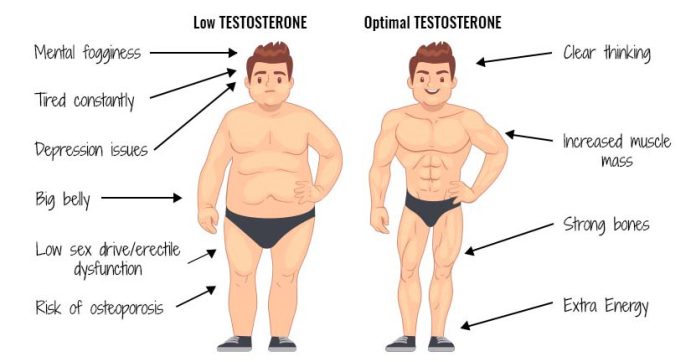Testosterone is the primary male hormone responsible for regulating sex differentiation, producing male sex characteristics, spermatogenesis, and fertility.
Physicians say the hormone regulates the male sex drive (libido), bone mass, fat distribution, muscle mass and strength, and the production of red blood cells and sperm.
They add that being the androgen in human males, testosterone plays a key role in the development of male reproductive tissues such as testicles and prostate, as well as promoting secondary sexual characteristics such as increased muscle and bone mass, and the growth of body hair.
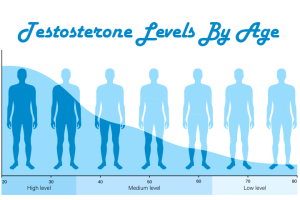 Physicians note that as men age, their testosterone levels naturally decline. They add, however, that there are several lifestyle changes and medical interventions that may help increase testosterone levels in older men.
Physicians note that as men age, their testosterone levels naturally decline. They add, however, that there are several lifestyle changes and medical interventions that may help increase testosterone levels in older men.
Here are some options to consider:
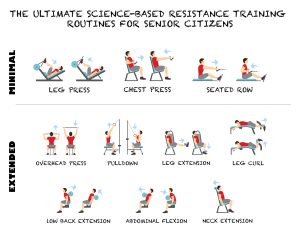 Exercise regularly: Physiotherapist, Titilade Omilani, says regular exercise, particularly resistance training, can help increase testosterone levels in older men.
Exercise regularly: Physiotherapist, Titilade Omilani, says regular exercise, particularly resistance training, can help increase testosterone levels in older men.
“Aim for at least 30 minutes of moderate-intensity exercise most days of the week,” she counsels.
Maintain a healthy weight: Doctors say being overweight or obese can contribute to lower testosterone levels. “Losing weight and maintaining a healthy weight through diet and exercise can help improve testosterone levels,” says Dr. Azeezat Ibrahim, a General Practitioner.

 Eat a healthy diet: According to nutritionists, a balanced diet that includes plenty of fruits, vegetables, whole grains, lean protein, and healthy fats can help support healthy testosterone levels.
Eat a healthy diet: According to nutritionists, a balanced diet that includes plenty of fruits, vegetables, whole grains, lean protein, and healthy fats can help support healthy testosterone levels.
Some research suggests that a diet high in zinc and vitamin D may also help increase testosterone levels.
Nutritionists say poor nutrition is at the root of many diseases and can also create an imbalance of male hormones.
Foods to avoid include excessive sugar; excessive caffeine; red meat and other sources of animal fat; excessive dairy products; food dyes; processed foods.
Foods to eat include: green tea; multicolored fruits and vegetables; nuts; fiber (covered by eating fruits and vegetables); and soy products (soy milk instead of cow’s milk).
Poor sleep quality or insufficient sleep can contribute to lower testosterone levels
Manage stress: Experts say chronic stress can contribute to lower testosterone levels. Doctors say cortisol levels in the blood are indicators of stress level.
“This steroid hormone can increase fat deposition, resulting in more conversion of testosterone to estrogen.
“Finding ways to manage stress, such as through meditation, yoga, or other relaxation techniques, may help improve testosterone levels,” Dr. Ibrahim says.
Get enough sleep: Poor sleep quality or insufficient sleep can contribute to lower testosterone levels. “Aim for at least 7-8 hours of sleep per night to help support healthy testosterone levels,” doctors counsel.
 Tobacco and alcohol: Experts are unanimous in warning that tobacco reduces testosterone; while alcohol (more than two drinks a day), increases the conversion of testosterone to oestrogen, a female hormone.
Tobacco and alcohol: Experts are unanimous in warning that tobacco reduces testosterone; while alcohol (more than two drinks a day), increases the conversion of testosterone to oestrogen, a female hormone.
Avoid opioid pain medications: A pharmaceutical outlet proprietor, Bose Adekunle, warns that morphine and other opiates decrease testosterone.
“This can go on for months to years while a person is being treated with opioid medications. Testosterone levels can drop as quickly as a few hours after starting opioids; and it appears that the higher the dose of opioids, the greater the risk of low testosterone,” Adekunle warns.
She, however, says that this side effect should be reversible after stopping the pain medication; even as she warns against stopping or changing pain medication suddenly without consulting with the prescribing provider.
 Avoid xenobiotics: Experts say research has shown that the average testosterone level in men has gradually dropped over the years, and that this may be in part due to all the environmental toxins that have accumulated over the years.
Avoid xenobiotics: Experts say research has shown that the average testosterone level in men has gradually dropped over the years, and that this may be in part due to all the environmental toxins that have accumulated over the years.
They warn humans to avoid xenobiotics, which are compounds from the environment that mimic the body’s hormones, and they could be found in drugs, pesticides, cosmetics, flavourings, fragrances, food additives, industrial chemicals and environmental pollutants.
They also warn against toxins such as:
• Bisphenol A (BPA) — found in plastics. To avoid it, don’t microwave food in
plastic containers. Avoid plastic containers with the numbers 3, 6, or 7 engraved in
the triangle on the product. Buy BPA-free water containers. Drinking water out of
containers with the numbers 2, 4, 5, or 7 is OK. Do not drink out of Styrofoam
containers.
As much as possible, don’t microwave food in plastic containers
• Phthalates. These chemicals are used in plastics, coatings, lubricants, and binders. Many are found in hygiene products such as shampoos and colognes. Be mindful of the products you use!
• Organophosphates. These are mainly found in pesticides and herbicides. So, eat
organic when possible to avoid exposure to them.
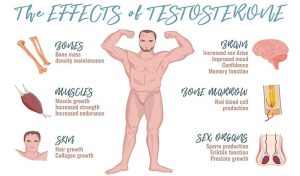 Consider testosterone replacement therapy: Dr. Ibrahim says if lifestyle changes aren’t enough to boost testosterone levels, your healthcare provider may recommend testosterone replacement therapy.
Consider testosterone replacement therapy: Dr. Ibrahim says if lifestyle changes aren’t enough to boost testosterone levels, your healthcare provider may recommend testosterone replacement therapy.
“This may involve testosterone injections, gels, or patches. It’s important to weigh the potential risks and benefits of testosterone replacement therapy with your healthcare provider, as this treatment can have side effects and isn’t appropriate for everyone,” she warns.
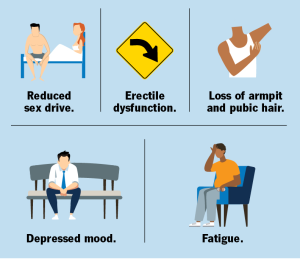
The physician says it’s important to work closely with your healthcare provider to develop a personalized plan to manage low testosterone levels.
“The healthcare provider can help determine the underlying cause of low testosterone and recommend appropriate treatment options based on your individual health status and needs,” she adds.

